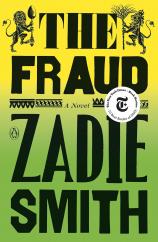The Fraud
Review
The Fraud
Whether in fiction or nonfiction, Zadie Smith has never lacked for diversity in the subject matter of her work. In her latest novel, THE FRAUD, she turns to historical fiction for the first time. Focusing on a sensational trial and on the life of a writer prominent in his time but now forgotten, it’s a sumptuous portrait of life in Victorian England --- a time when the British Empire still reigned supreme around the globe, even as the cracks in the foundation of that empire were becoming apparent.
The author in question is William Ainsworth, whose novel JACK SHEPPARD outsold his contemporary Charles Dickens’ OLIVER TWIST. None of Ainsworth’s 41 novels, many of which were bestsellers in their day, remains in print. He is seen here through the jaded eyes of his cousin by marriage, Edinburgh-born Eliza Touchet --- a woman “spiky, certainly, and probably a tad severe, but also witty and lively in conversation” --- who shares several households with Ainsworth as his housekeeper and occasional lover, beginning shortly after she’s deserted by her husband, who absconds with their daughter. When both die of scarlet fever, she learns in her early 30s that she’s been excised from his will, forcing her into the servant’s life to escape poverty. As Ainsworth’s literary career gradually flags, she follows him on his downwardly mobile path through a series of increasingly less impressive quarters.
"There are moments of both deep seriousness and levity in THE FRAUD, but at every turn, Zadie Smith succeeds in evoking a vivid sense of life in 19th-century England that makes it feel both alien and oddly familiar."
Smith has great sport enumerating the shortcomings of Ainsworth’s ponderous prose and bloated, haphazardly researched historical novels. As Eliza, herself a capable writer, describes him, he was someone “beyond the reach of editorial intervention.” She also comments wryly on some of the perils of the writing life, noting, when Ainsworth is working feverishly on a novel to help extricate his first wife’s family from debt, that “the writing of novels --- even good ones --- did not seem, to Mrs. Touchet, a rational response to a financial crisis.”
The novel is sprinkled with entertaining cameos by some of London’s great 19th-century literary personalities, including Charles Dickens. He was “an irresistible and irrepressible young man” about whom Eliza felt “equally fascinated and repulsed” when describing him in 1838. She dismisses his gift of a first edition of A CHRISTMAS CAROL as a “ghost story for the simple-minded.”
But at the heart of the story is the celebrated Tichborne case of the early 1870s. A man known as Thomas Castro (or Arthur Orton) stakes claim to the identity of Sir Roger Tichborne, believed lost in a shipwreck but now apparently returned from Australia. He is accompanied by a former Jamaican slave, Andrew Bogle, who once worked for Tichborne’s uncle on a sugar cane plantation in Jamaica and then followed him to England when he returned there.
“In a storm of absurdity, Mr. Bogle was the calm eye,” Eliza observes of his presence as a steadfast witness for the man who claims, in the face of substantial contradictory evidence, that he’s “Sir Roger.” As Smith colorfully portrays it, the Tichborne case’s protracted civil and criminal trials ignited popular passion like that surrounding O.J. Simpson’s criminal prosecution in the 1990s.
Eliza spends many days in the spectator gallery at these trials, noting that “the line between courtroom and theatre was far thinner than she would have supposed.” She’s usually in the company of Ainsworth’s second wife, a much younger woman named Sarah Wells, who comes from a less than savory background and is the mother of his fourth daughter. Eliza befriends Andrew Bogle and his son, Henry. In the novel’s central section, she sensitively recounts the story that Andrew, a deeply sympathetic, even tragic character, shares of his life.
In Smith’s able hands, the Tichborne case --- and particularly the role of Andrew Bogle in supporting “the Claimant,” as Castro/Orton becomes known --- serves as a potent vehicle for exploring (and exposing) the evils of British colonialism and, in particular, its exploitation of the slave trade to fuel its economic engine. In Eliza’s view, England and Jamaica “were, in reality, two sides of the same problem, profoundly intertwined.”
Eliza is attracted to the abolitionist movement in Britain, and there are several scenes of her attending meetings of its supporters. The novel also addresses issues of gender and class, as Eliza’s circumstances require her to suppress her own ambition as a writer while she watches the far less capable Ainsworth flaunt his dubious literary talent.
Smith has chosen an unusual structure for the novel, dividing it into eight “volumes,” all composed of a series of concise chapters, some as short as a paragraph. She abandons any chronology, ranging back and forth across roughly five decades of British history, from the 1830s to the 1870s. This may make it sound more challenging than it is, because Smith never allows the plot’s momentum to flag. There are moments of both deep seriousness and levity in THE FRAUD, but at every turn, Zadie Smith succeeds in evoking a vivid sense of life in 19th-century England that makes it feel both alien and oddly familiar.
Reviewed by Harvey Freedenberg on September 8, 2023
The Fraud
- Publication Date: September 3, 2024
- Genres: Fiction, Historical Fiction
- Paperback: 464 pages
- Publisher: Penguin Books
- ISBN-10: 0525558985
- ISBN-13: 9780525558989




